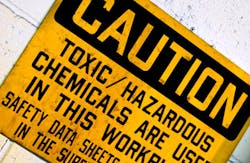The federal program that aims to inform the U.S. population of the presence of hazardous chemicals is dangerously compromised in many states and could be ineffective in the event of an incident, a Reuters investigation finds.
A database that contains data of all the potentially dangerous chemicals stored in both private and public facilities was created under the Emergency Planning and Community Right-to-Know Act almost three decades ago. This database, known as Tier II report, should be compiled by state and county emergency-management offices and should then be made public. However, an investigation by Reuters has found that very often data is misreported or omitted by plant owners and authorities have been negligent in their oversight of the reports. In fact, local authorities have not been involved in auditing reports at all, with the exception of a few states.
It is estimated that the number facilities across the United States required to submit Tier II reports is several hundred thousand and the number of chemicals that should be reported is about 500,000. The U.S. Environmental Protection Agency (EPA) has claimed that incidents at facilities storing such chemicals are the deadliest in the United States, causing approximately 60 deaths and over 1,300 injuries since 2005. The combined onsite and off-site damage those events have caused is estimated to exceed $1.6 billion, an EPA report to Congress stated. Effectively, the EPA has no mechanism to audit Tier II reports, it said, but it can inspect facilities that store hazardous materials after receiving a complaint or when inspecting compliance with other regulations.
RELATED: Explosion at Louisiana chemical plant kills one, injures 77
During its analysis of the database, Reuters detected multiple errors in Tier II reports submitted in recent years. Moreover, there were facilities that had not filed any reports at all. The news agency said that Illinois and Wisconsin had introduced errors to the public databases through which they disclose information from the reports. The reports concern the storage of ammonium nitrate, lead, sulfuric acid and diesel fuel, among other hazardous chemicals.
Failure to disclose information on hazardous chemicals can have serious consequences. Reuters reported that back in 2006, Kentucky-based clothing company Carhartt Inc. did not inform the authorities that there was chlorine stored in its premises. When a fire broke out at the facility, two firefighters were exposed to the chemical without being equipped with the proper safety gear and one of them suffered serious chemical burns in the incident. The company did not explain why no record of the presence of the chemical was submitted to the database.
Carhartt is far from being the only company that has failed to submit a Tier II report. Another one, a North Dakota water-treatment facility, did not file a report this year and Reuters informed state officials of the violation. As a result, the company submitted a Tier II report which revealed that there were amounts of ammonium hydroxide, chlorine, sulfuric acid, sodium hydroxide, sodium permanganate, hydrochloric acid and phosphoric acid — all explosive materials — stored in its premises. The company told Reuters that it was unaware of the reason for not filing the report and stated that an internal investigation had been launched.



